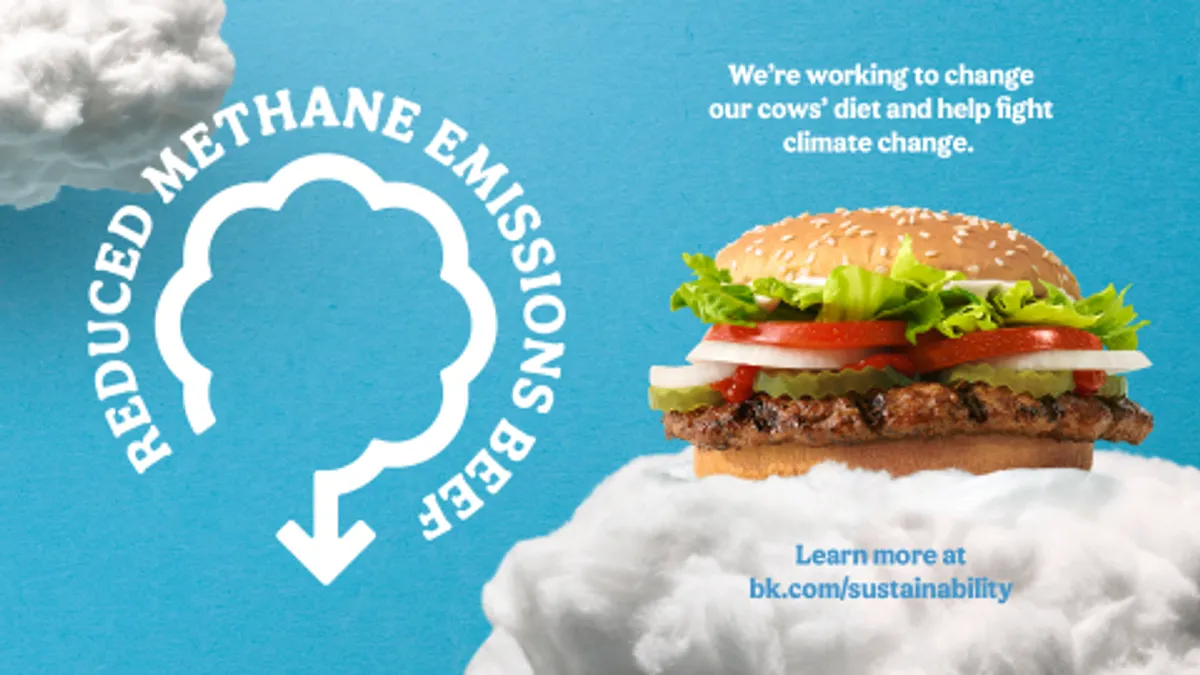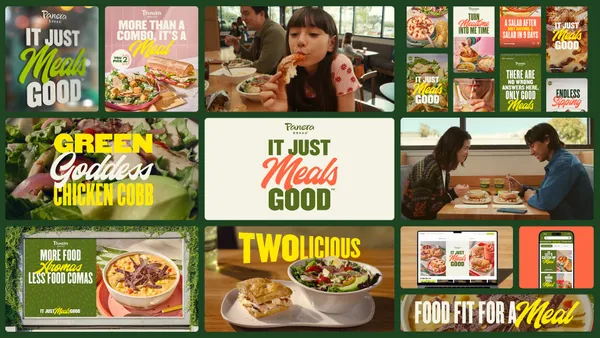Dive Brief:
- Burger King released an educational video that uses a quirky song to illustrate the negative environmental impact of the livestock industry, according to an announcement. The campaign promotes a new Whopper offering that's sourced from cows fed a diet designed to lower their methane emissions.
- Developed with agency We Believers, the explainer ad stars Mason Ramsey — a.k.a. the "Walmart kid" — as he sings about how cow burps, farts and "splatters" are no laughing matter, as they constitute a form of greenhouse gas that contributes to climate change.
- Burger King partnered with U.S. scientists to develop a new diet for beef livestock used in Whoppers, adding a small amount of lemongrass to their feed. Early studies indicate the change can reduce daily methane emissions 33%. Starting today, the brand will sell Whoppers using the more climate-conscious meat at select locations in Miami, New York City, Austin, Portland and Los Angeles.
Dive Insight:
Burger King's latest campaign directly acknowledges the role the brand plays in contributing to climate change, albeit in a lighthearted way intended to educate consumers on the environmental impact of the livestock industry and raise awareness for a new low-methane emission Whopper.
"Since we are part of the problem, we are working to be part of the solution," a white text overlay reads at the close of the "Cows Menu" ad, which depicts a carnival-like "Low Carbon Land" utopia.
The twee music video starring Ramsey, who went viral for yodeling in a Walmart location two years ago, looks to make "a complicated problem fun to digest," per the news release, although it remains to be seen if climate-conscious consumers are receptive to the jokey approach. The two-minute spot was directed by Michel Gondry ("Eternal Sunshine of the Spotless Mind") and filmed in Los Angeles before the novel coronavirus led to the shutdown of studios in the U.S., according to Adweek.
The purpose-driven campaign arrives as part of Burger King parent company's Restaurant Brands for Good framework to improve sustainability in the industry and create a positive social impact with consumers. Livestock contributes to roughly 14.5% of global greenhouse gas emissions, according to data from the United Nations' Food and Agriculture Organization shared by Burger King.
Given the scope of the problem, Burger King is taking what it bills as an "open source" approach to its sustainability initiatives, including the research around the new lemongrass formula for beef livestock.
"We are making all our findings public," Fernando Machado, global CMO of Burger King and RBI, said in a press statement. "If the whole industry, from farmers, meat suppliers, and other brands join us, we can increase scale and collectively help reduce methane emissions that affect climate change."
The introduction of the Reduced Methane Emissions Beef Whopper follows a concentrated push by Burger King to add more meatless options to its menu. Last year, the marketer rolled out the plant-based Impossible Whopper nationwide in the U.S. Early trials of the vegan-friendly sandwich drove up to an 18% increase in foot traffic at store locations, analysts found.
It's clear that Burger King has been building up to the announcement of a low-emission Whopper for several months given the campaign's pre-pandemic production schedule. Dine-in restaurant locations in several states have in recent weeks started to open back up, although a new surge in COVID-19 cases is leading to the reinstatement of some lockdown orders, including those impacting bars and restaurants.















